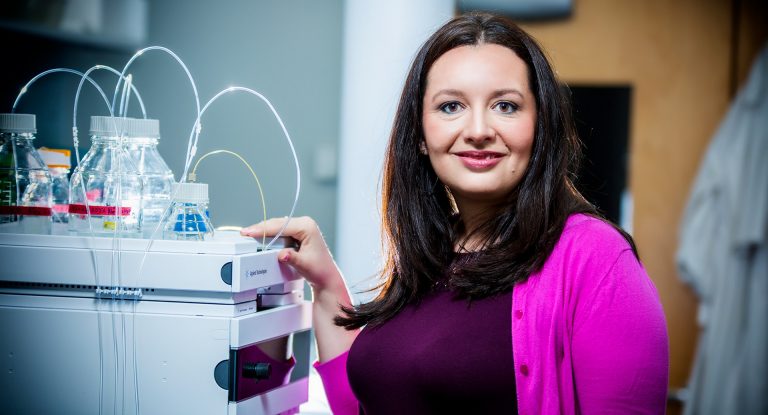Concordia professor Dajana Vuckovic wins the 2023 Fred Beamish Award from the Canadian Society for Chemistry

Concordia’s Dajana Vuckovic has won the prestigious 2023 Fred Beamish Award presented by the Analytical Chemistry Division of the Canadian Society for Chemistry. Vuckovic was recognized for her many important contributions to the field of analytical chemistry.
The award is presented every year to junior researchers who demonstrate innovation and whose research is anticipated to have significant potential for practical applications.
Vuckovic, associate professor of chemistry and biochemistry and director of the Centre for Biological Applications of Mass Spectrometry, is the first Concordia professor to receive the award.
“It’s super exciting to win this award, and it shows that Concordia is growing its research and being recognized on a national stage,” Vuckovic says. ”There haven’t been many female winners, so it’s also humbling to be a role model for the current and next generations of women scientists in analytical chemistry.”
Exploring the link between inflammation and cardiovascular diseases
Vuckovic holds the Concordia University Research Chair in Clinical Metabolomics and Biomarkers. She has been working on developing novel ways of measuring very small amounts of biomarkers in biological samples like blood, urine or tissue.
In 2019, Vuckovic’s lab published an article describing a new method to sample and measure a type of biomarker called oxylipins from tissue or blood.
Oxylipins are naturally occurring compounds in the human body that can either help promote or resolve inflammation. They have been linked to many cardiovascular diseases and Alzheimer’s Disease.
According to Vuckovic, they’re particularly challenging to measure.
“It’s a very complex family of compounds,” she explains. “We developed liquid chromatography-mass spectrometry methods to be able to detect very low levels of oxylipins and to distinguish one compound from another.”
Liquid chromatography allows Vuckovic’s lab to separate the compounds they are interested in from other compounds that are present in the sample of blood or tissue. Mass spectrometry is a technology that allows them to measure and identify incredibly small quantities of molecules — one billionth of a gram of a pharmaceutical drug, say — in a blood or urine sample.
Vuckovic says these innovative measurement methods will allow scientists to further research how these oxylipins may contribute to the development of plaque in arteries.
Evaluating Canadians’ exposure to toxins
In a 2018 paper, Vuckovic’s team described a way to evaluate the Canadian population’s exposure to mycotoxins. These are toxins produced by fungi and are commonly detected in Canada’s food supply.
Food becomes contaminated if mold develops. Found in everything from dried fruits to grains to animal products, mycotoxins are linked to several adverse health effects, such as reduced immune function and cancer.
Vuckovic’s lab developed a method to measure mycotoxins in urine and blood samples. They also looked at how mycotoxins are metabolized and broken down into new compounds by our body. They found more than 200 of these mycotoxin metabolites — 100 of which were previously unknown.
Improving data quality
This award also recognizes Vuckovic for her contributions to the burgeoning field of metabolomics. Beyond her research to develop new measurement methods in metabolomics, she is co-lead of the Best Practices Working Group of Metabolomics Quality Assurance and Quality Control Consortium, an international consortium to bring better controls to the field.
“Metabolomics is the science of measuring hundreds to thousands of small metabolites in a biological sample in a single analysis,” Vuckovic notes.
The related field of genomics looks at the genetic makeup of a biological system as essentially a blueprint for an organism. Metabolomics, meanwhile, looks at what happens inside a system when all its parts are working at a particular instance in time.
Because metabolomics is a relatively young field, researchers are still working out the best methods to measure the metabolome and how to evaluate the quality of data. The consortium Vuckovic is part of aims to introduce standard measurement and reporting guidelines across the field.
Find out more about Concordia’s Centre for Biological Applications of Mass Spectrometry.


